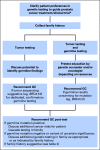Evolving Intersection Between Inherited Cancer Genetics and Therapeutic Clinical Trials in Prostate Cancer: A White Paper From the Germline Genetics Working Group of the Prostate Cancer Clinical Trials Consortium
- PMID: 30761386
- PMCID: PMC6370313
- DOI: 10.1200/PO.18.00060
Evolving Intersection Between Inherited Cancer Genetics and Therapeutic Clinical Trials in Prostate Cancer: A White Paper From the Germline Genetics Working Group of the Prostate Cancer Clinical Trials Consortium
Abstract
Purpose: Advances in germline genetics, and related therapeutic opportunities, present new opportunities and challenges in prostate cancer. The Prostate Cancer Clinical Trials Consortium Germline Genetics Working Group was established to address genetic testing for men with prostate cancer, especially those with advanced disease undergoing testing for treatment-related objectives and clinical trials.
Methods: The Prostate Cancer Clinical Trials Consortium Germline Genetics Working Group met monthly to discuss the current state of genetic testing of men with prostate cancer for therapeutic or clinical trial purposes. We assessed current institutional practices, developed a framework to address unique challenges in this population, and identified areas of future research.
Results: Genetic testing practices in men with prostate cancer vary across institutions; however, there were several areas of agreement. The group recognized the clinical benefits of expanding germline genetic testing, beyond cancer risk assessment, for the goal of treatment selection or clinical trial eligibility determination. Genetic testing for treatment selection should ensure patients receive appropriate pretest education and consent and occur under auspices of a research study whenever feasible. Providers offering genetic testing should be able to interpret results and recommend post-test genetic counseling for patients. When performing tumor (somatic) genomic profiling, providers should discuss the potential for uncovering germline mutations and recommend appropriate genetic counseling. In addition, family members may benefit from cascade testing and early cancer screening and prevention strategies.
Conclusion: As germline genetic testing is incorporated into practice, further development is needed in establishing prompt testing for time-sensitive treatment decisions, integrating cascade testing for family, ensuring equitable access to testing, and elucidating the role of less-characterized germline DNA damage repair genes, individual gene-level biologic consequences, and treatment response prediction in advanced disease.
Conflict of interest statement
AUTHORS’ DISCLOSURES OF POTENTIAL CONFLICTS OF INTEREST The following represents disclosure information provided by authors of this manuscript. All relationships are considered compensated. Relationships are self-held unless noted. I = Immediate Family Member, Inst = My Institution. Relationships may not relate to the subject matter of this manuscript. For more information about ASCO’s conflict of interest policy, please refer to www.asco.org/rwc or ascopubs.org/po/author-center.
Figures
Similar articles
-
Germline Genetic Testing in Advanced Prostate Cancer; Practices and Barriers: Survey Results from the Germline Genetics Working Group of the Prostate Cancer Clinical Trials Consortium.Clin Genitourin Cancer. 2019 Aug;17(4):275-282.e1. doi: 10.1016/j.clgc.2019.04.013. Epub 2019 Apr 18. Clin Genitourin Cancer. 2019. PMID: 31171481 Free PMC article.
-
Bringing Prostate Cancer Germline Genetics into Clinical Practice.J Urol. 2019 Aug;202(2):223-230. doi: 10.1097/JU.0000000000000137. Epub 2019 Jul 8. J Urol. 2019. PMID: 30730411 Review.
-
American Society of Clinical Oncology policy statement update: genetic testing for cancer susceptibility.J Clin Oncol. 2003 Jun 15;21(12):2397-406. doi: 10.1200/JCO.2003.03.189. Epub 2003 Apr 11. J Clin Oncol. 2003. PMID: 12692171
-
Implementation of Germline Testing for Prostate Cancer: Philadelphia Prostate Cancer Consensus Conference 2019.J Clin Oncol. 2020 Aug 20;38(24):2798-2811. doi: 10.1200/JCO.20.00046. Epub 2020 Jun 9. J Clin Oncol. 2020. PMID: 32516092 Free PMC article.
-
Mainstream germline genetic testing in men with metastatic prostate cancer: design and protocol for a multicenter observational study.BMC Cancer. 2022 Dec 30;22(1):1365. doi: 10.1186/s12885-022-10429-2. BMC Cancer. 2022. PMID: 36581909 Free PMC article.
Cited by
-
TARGET: A Randomized, Noninferiority Trial of a Pretest, Patient-Driven Genetic Education Webtool Versus Genetic Counseling for Prostate Cancer Germline Testing.JCO Precis Oncol. 2024 Mar;8:e2300552. doi: 10.1200/PO.23.00552. JCO Precis Oncol. 2024. PMID: 38452310 Free PMC article. Clinical Trial.
-
Predisposition to prostate cancer and clinical implications in a real-life cohort.Eur J Hum Genet. 2025 May 6. doi: 10.1038/s41431-025-01859-0. Online ahead of print. Eur J Hum Genet. 2025. PMID: 40328961
-
Germline Genetics of Prostate Cancer: Prevalence of Risk Variants and Clinical Implications for Disease Management.Cancers (Basel). 2021 Apr 29;13(9):2154. doi: 10.3390/cancers13092154. Cancers (Basel). 2021. PMID: 33947030 Free PMC article. Review.
-
A first Japanese case of neuroendocrine prostate cancer accompanied by lung and brain metastasis with somatic and germline BRCA2 mutation.Pathol Int. 2019 Dec;69(12):715-720. doi: 10.1111/pin.12860. Epub 2019 Oct 20. Pathol Int. 2019. PMID: 31631483 Free PMC article.
-
Practical Considerations and Challenges for Germline Genetic Testing in Patients With Prostate Cancer: Recommendations From the Germline Genetics Working Group of the PCCTC.JCO Oncol Pract. 2020 Dec;16(12):811-819. doi: 10.1200/OP.20.00431. Epub 2020 Sep 28. JCO Oncol Pract. 2020. PMID: 32986533 Free PMC article. Review.
References
Grants and funding
LinkOut - more resources
Full Text Sources
Research Materials
Miscellaneous


